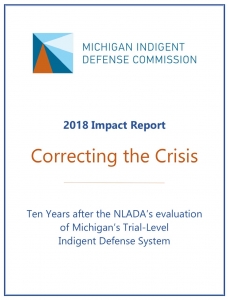Read the MIDC’s proposed standard for indigent defense workloads here.
MIDC RAND Time Study Quick Start Guide
MIDC RAND Time Study Users Guide
The Michigan Indigent Defense Commission (MIDC), with the assistance of the RAND Corporation, will be developing maximum caseload standards for the delivery of indigent defense services in Michigan in 2018. These standards will apply to the adult indigent criminal defense caseloads of all attorneys in the state, whether such appointments arise from a contract counsel program, an assigned counsel program, a public defender office, or some combination thereof. The MIDC has been charged by the Legislature with ensuring that the workload assigned to indigent defense counsel does not reach the point where effective representation is jeopardized:
The MIDC shall implement minimum standards, rules, and procedures to guarantee the right of indigent defendants to the assistance of counsel as provided under amendment VI of the Constitution of the United States and section 20 of article I of the state constitution of 1963. In establishing minimum standards, rules, and procedures, the MIDC shall adhere to the following principles: … (b) Defense counsel’s workload is controlled to permit effective representation. Economic disincentives or incentives that impair defense counsel’s ability to provide effective representation shall be avoided. The MIDC may develop workload controls to enhance defense counsel’s ability to provide effective representation.
Mich. Comp. Laws § 780.991
Maximum caseload standards are simply tools to help identify when the number and mix of criminal defense cases assigned an attorney are likely to have resulted in workload demands that may adversely impact the attorney’s ability to adequately discharge his or her ethical obligations to clients. Previously recognized maximum recommended caseload standards were developed in 1972 by the National Advisory Counsel (NAC) of the U.S. Department of Justice Task Force on the Courts, and recommended, for example, that indigent defenders take on no more than 150 new felonies or 400 new misdemeanors per year. Such standards are now almost a half century old, do not distinguish case types beyond a few simplistic categories, and, most importantly, do not reflect the particular challenges facing Michigan counsel who represent Michigan defendants in Michigan courtrooms for alleged violations of Michigan law. It is for this reason that the MIDC believes contemporary standards accurately reflecting the Michigan experience are needed to help avoid excessive caseloads that violate the Sixth Amendment.
How The Project Will Collect Information
The project involves three major data collections that will take place sequentially over the next few months. While additional information will be provided to the bar and local indigent defense systems as the launch date for each data collection approaches, the following is a general overview of these steps towards standards development:
The Indigent Defense Time Study
First, RAND will conduct a time study of indigent defense attorneys across the state of Michigan. What this means is that for approximately eight weeks, RAND will be asking attorneys who are appointed to criminal cases on Michigan trial courts to track the time they spend on all appointed cases on behalf of adult indigent defendants. By doing that, we can know how much time, on average, attorneys now spend on various client matters as well as the time expended on certain tasks commonly performed in those cases. Essentially every indigent defense attorney in the state will be invited to take part in the time study. Participation will, of course, be voluntary, but we hope that the critical importance of the caseload standard development work in assuring adequate resources for the future will provide ample incentives for attorneys to assist in this effort.
We will be using an online timekeeping application for the study which attorneys will be able to access from just about any internet-connected device, including desktop computers and smartphones. The application has been designed by JusticeWorks, a developer of case management systems and timekeeping software for indigent defense programs across the country. The application has been tailored to the needs of this project by RAND and the MIDC. Note that only time directly spent on indigent defense cases will be tracked; time spent on other matters (such as privately retained cases, civil court matters, or non-case specific activities) will not be recorded.
As a result of the submission of compliance plans by local indigent defense systems last November, the MIDC has assembled a master list of Michigan indigent defense attorneys and their email addresses. Invitations to participate in the Indigent Defense Time Study and instructions on how to submit time information will be sent to those attorneys by email.
It is vitally important that indigent defense attorneys participate in this time study. While the burden of tracking case-related time for appointed clients over the eight week period is admittedly not trivial, the information gathered will help inform the caseload standards setting process and will make sure that the final results are grounded in reality rather than mere conjecture.
The Attorney Time Sufficiency Survey
While extremely important, the time study will only describe the current reality in Michigan indigent defense, which may not reflect optimal caseload levels. In that light, the second data collection will seek to learn whether the bar believes that these average time expenditures are sufficient for effective and ethical representations. After the time study is complete, we will conduct a brief web-based survey to find out what attorneys think is the minimum amount of time that should be devoted, on average, to criminal defense cases in order to provide adequate legal representation. The survey will present results from the time study and will ask whether or not those averages are reasonable. Essentially every indigent defense attorney in the state will be invited by email to take part in the survey, even if he or she did not participate in the time study.
As was true with the time study, attorney participation in the time sufficiency survey is extremely important. This survey provides an explicit means for the indigent defense bar to voice their opinions as to whether they consistently have enough time available to defend all of their clients in a Constitutionally and professionally responsible manner.
The Caseload Standards Conference
The final data collection activity will involve a session designed to synthesize the opinions of a panel of select attorneys with extensive experience in the delivery of criminal defense in Michigan. After sharing the results of the time study and time sufficiency survey with the panel members, the session will employ the RAND-developed Delphi methodology to build consensus among these attorney experts as to the minimum amount of time that, on average, would be required to provide criminal defendants with adequate legal services in various types of cases.
The output of the Delphi session will be evaluated, and the results used as the basis for the MIDC’s recommended maximum caseload standards. The standards will describe the maximum number of cases of any particular type that can be effectively represented by a full time attorney over one year.
One important area that should be noted are the confidentiality procedures that RAND will follow. None of the results of this work will be published or circulated in a form in which individual attorneys or their clients can be identified. Neither the MIDC, Michigan courts, indigent defense administrators and organizations, nor the defense providers themselves will receive data from the time study or the sufficiency survey that will allow time expenditures or activity information to be linked with individual attorneys or individual cases. Attorneys participating in the time study or the sufficiency survey will be given unique usernames and passwords to log onto the data collection websites, and the crosswalk between those IDs and the attorneys’ names will be destroyed after the project is complete. RAND takes the protection of sensitive information extremely seriously, and complies with stringent federal standards in this area.
Timeline
At the present time, we anticipate that key project events will take place as follows. The timeline is subject to revision by the MIDC and the RAND researchers.
Week of June 4
- Initial announcement about the caseload standards project sent to indigent defense attorneys in Michigan by email.
Week of June 11
- Instructional materials sent to indigent defense attorneys, including announcement of open registration week.
Week of June 18
- Open registration period for participating attorneys begins and continues for one week.
Week of June 25
Weeks of July 2 through August 6
- Weeks 2 through 7 of time study.
Week of August 13
Week of August 20
- Announcement to attorneys that time sufficiency survey will follow end of time study.
Week of August 27
- Time sufficiency survey begins.
Week of September 3
- Time sufficiency survey ends.
Week of September 10
- Caseload standards setting conference in Lansing.
Week of September 17
- Provisional standards delivered to the MIDC.
Additional Information
We plan to periodically this MIDC project webpage with more detailed project timelines, instructions for participating in the indigent defense time study and attorney time sufficiency survey, and notices of upcoming events.
Finally, we reiterate our hope that the indigent defense bar will understand that participation in the data collection efforts described above will have lasting and profound consequences for their profession and for their clients in the years to come.
If you have any questions, please contact Dr. Jonah Siegel, Research Director at the Michigan Indigent Defense Commission by phone (1-517-657-3062) or email (jsiegel@michiganidc.gov). Nicholas M. Pace, project lead at the RAND Corporation, can be reached at nickpace@rand.org or 1-310-393-0411 ext. 6176.

